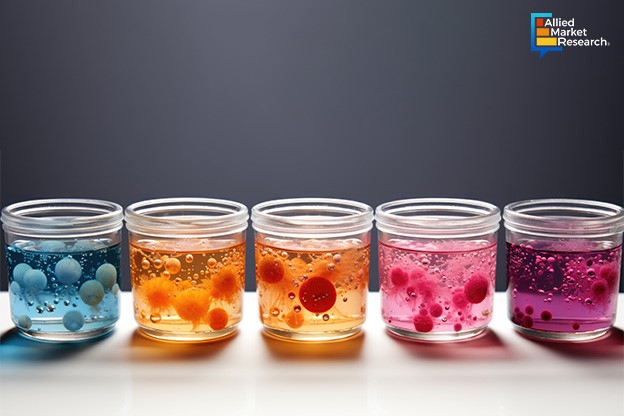Can Harnessing the Power of Food Cultures Transform Your Business with Flavorful and Healthier Options?

27 Feb
2024
Highlights:
- Introduction
- Applicability of food cultures
- Latest advances in food cultures
- Key developments in the sector
Fermentation is one of the oldest food science technologies that have been used by mankind for centuries. However, in the current age, it is becoming a new trend in product development and has numerous potential applications in introducing different food chains. Microbial activity in food helps to improve the taste, nutritional value, and shelf-life of several food items. These days, several food and beverage companies emphasize food cultures to ensure the safety and long life of various food products and provide numerous health benefits to individuals. Microbial food culture includes procedures that allow microorganisms such as yeasts, bacteria, and molds to reproduce in a predetermined culture medium to bring the desired alteration in the food product.
What are the various use cases of food cultures in the food businesses?
Though microbial food culture is a traditional process, it plays a major role in enhancing the flavor, texture, and nutritional value of food items. In fermented delicacies, microorganisms such as bacteria and molds are widely used in cheese-making processes. They are used to add a distinctive flavor and texture to various kinds of cheeses such as Blue cheese, Bocconcini, Brie, Camembert, and many others.
Moreover, lactic acid bacteria act as a catalyst in the fermentation process of milk into yogurt. Live bacteria cultures are not only found in yogurt and yogurt-like drinks called kefir, but also in various Korean pickled vegetables called kimchi, sauerkraut, and other pickles. Most of the pickled jars available at supermarkets contain vinegar as a preservative which means they don’t contain probiotics. People should check the label behind food items as showing “naturally fermented” to ensure the fermented food contains probiotics.
However, yeast plays a big role in the fermentation process of alcoholic beverages. Mostly, the production of beer and wine involves the use of specific strains of yeast to boost the flavor, alcohol content, and carbonation of the final product. Additionally, “Kombucha” is a fermented tea beverage that uses a symbiotic culture of bacteria and yeast to offer a unique taste and effervescence. Moreover, the production of sourdough bread includes wild yeast and lactic acid bacteria that help impart a complex and rich flavor profile.
Advances in food cultures
These days, the progress in the food industry includes the development of applicative engineering and biotechnologies. According to research, microorganisms can play an impressive role in producing various value-added compounds such as omega 3 (DHA), flavors, and organic acids to provide natural aromas, and colorants, and increase the nutritional value of food items. The recent innovation in biotechnology involves precision fermentation which allows precise control of microbial cultures. This process can help enhance the consistency and quality of fermented products. Moreover, researchers are trying new possibilities in synthetic biology to design custom microbial strains to meet specific requirements such as personalized flavors and textures in food products.
How can recent developments in the sector transform various food businesses?
The food cultures industry is experiencing significant growth and is predicted to rise at a CAGR of 4.8% during 2023-2032. Many players in the domain have undergone a series of mergers and acquisitions and come up with innovative products to foster competitiveness. For instance, CV Sciences, Inc., a leading consumer wellness company announced its acquisition of Cultured Foods, a renowned manufacturer and distributor of alternative plant-based vegan foods. With this acquisition, the companies aimed to produce specialty food across the US and European countries. This acquisition would also help CV Sciences to emerge as a more diverse global health and wellness company.
Another instance is the launch of LALCULT® Protect MC1, a powerful solution to control mold and yeast growth in dairy products, by Lallemand Specialty Cultures, a leading business dedicated to customized bacteria fermentation and specialty cultures for food applications. This newly developed solution would help extend the shelf-life of dairy products, offering a cheaper and more efficient solution for producers.
To sum up, the increasing trend among consumers toward maintaining good health and well-being will increase the demand for food items containing higher nutritional value, promoting the need for food cultures in the coming epoch. Moreover, the increasing demand for probiotics among individuals because of their numerous health benefits will bring extensive opportunities for the sector in the future.
To measure the historical performance of the food cultures industry in terms of revenue growth, adoption, and overall penetration, feel free to talk to our experts today! They can also help you develop new business strategies and initiatives.

Rosy Behera
Author's Bio- Rosy Behera holds a bachelor’s degree in Electrical and Electronics Engineering and now she is a content writer by profession. She loves to portray her thoughts and ideas with a nice command of words. Grabbing an audience with her creative write-ups is one of her biggest assets so far. Apart from writing, she is a certified “Odisi” dancer and has done Gardharva in Drawing, Painting, and Arts. She always explores new things through travel and is a big foodie.
Avenue: Entire Library membership of Allied Market Research Reports at your disposal
- Avenue is an innovative subscription-based online report database.
- Avail an online access to the entire library of syndicated reports on more than 2,000 niche industries and company profiles on more than 12,000 firms across 11 domains.
- A cost-effective model tailored for entrepreneurs, investors, and students & researchers at universities.
- Request customizations, suggest new reports, and avail analyst support as per your requirements.
- Get an access to the library of reports at any time from any device and anywhere.
Related Post
-
How are Submarine Cables Transforming Global Connectivity with Enhanced User Experience?
-
Endoscopy Procedures: Transformations in Techniques and Applications
-
AI-Powered Video Analytics: How the Product Actually Works for enterprises
-
Painting Robots: Transforming Precision Coating and Creative Applications
-
Innovations in Pharmacovigilance Systems Advancing Patient Safety
-
Understanding Edge Security: Keeping Data Safe Near the Source
-
Exploring the Use and Advancements of 3D Laser Scanners in Professional Applications
-
Reinforcing Industrial Controls with Smarter Tools and Training








